Chicago Bishop Paula Clark credits faith for carrying her through health crisis, family tragedyPosted Apr 14, 2023 |
|
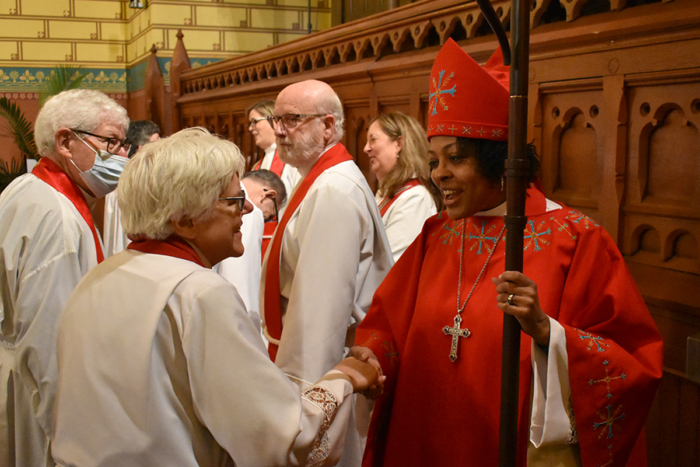
Chicago Bishop Paula Clark greets clergy on April 4 after the Chrism Mass and Renewal of Vows at St. James Cathedral. Photo: David Paulsen/Episcopal News Service
[Episcopal News Service – Chicago, Illinois] Spend even the briefest of time with Chicago Bishop Paula Clark and you’re bound to hear her bright voice lavishing a good amount of praise and thanksgiving on a range of recipients. She uses the word “awesome” often, whether describing a recent visit to a parish in Wauconda, Illinois – “They are doing awesome ministry!” – or talking about her own ordination and consecration as bishop before a crowd of more than 800 people in September 2022.
“It was awesome, it really was,” she told Episcopal News Service in an interview last week in her downtown office.
Awesome, or awe-inspiring, could also describe her own story, particularly her surviving and recovering from a debilitating brain condition known as an arteriovenous malformation. She was born with the condition, but it remained undetected until April 2021, when two weeks before her original consecration date it manifested as a life-threatening health crisis.
Clark was in the middle of a workout at a Chicago health club. Suddenly “things went haywire,” she said. She couldn’t walk. Her body wasn’t responding. Paramedics and doctors initially suspected she was dehydrated from exercising, she recalled, but a friend, who is a doctor, insisted she request a CAT scan. It revealed she had suffered a cerebral bleed, and after conducting additional angiograms, doctors diagnosed the arteriovenous malformation in her brain.
Clark suffered a stroke while surgeons operated, a side effect of their attempts to fix the brain’s wiring. The procedure was otherwise successful. Her consecration was delayed more than 18 months as she tended to her health.
In the middle of her recovery, Clark was dealt a second shock: Her husband, Andrew McLean, was diagnosed with end-stage multiple myeloma, a cancer that forms in plasma cells. He died in November 2021.
She looks back on that time with understated somberness. “I can have better years than 2021. It was a rough one,” Clark said.
Now, nearly seven months into her episcopate, Clark is looking to the future with renewed hope and faith. She regularly travels to congregations around the diocese, accompanied and assisted by her chaplain, Luis Garcia. She can walk, though not yet as fast as she would like. Her voice is still slightly slurred but steady, and she speaks with confidence.
Clark’s health crisis seemed to fade into the background on April 4 as she presided at her first Chrism Mass and Renewal of Vows at St. James Cathedral. The annual service is a chance for clergy and lay leaders to connect during Holy Week while the bishop blesses the baptismal oil that will be used across the diocese throughout the coming year. Clark also presided the next day at a second, similar service about three hours west at All Saints Episcopal Church in Rock Island, Illinois. The diocese spans northern and west central Illinois.
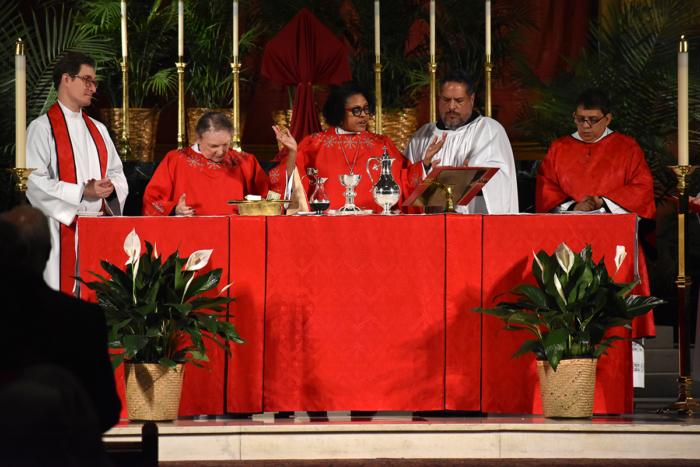
Chicago Bishop Paula Clark celebrates Holy Eucharist on April 4 at St. James Cathedral. Her chaplain, Luis Garcia, stands next to her in white. Photo: David Paulsen/Episcopal News Service
At the cathedral, with dozens of priests and deacons processing ahead of her on the sidewalk, Clark followed them slowly at the rear, her signature glossy red Nike sneakers matching her red vestments and bishop’s mitre. Garcia carried Clark’s crosier as they climbed the few steps into the cathedral, and he sat next to her on the altar during the service. For the chrism blessing and renewal of vows, he held up the text for Clark to read.
“Let me just say how privileged I am to be here,” Clark said during the service’s announcements. She indicated that she would be greeting people at the exit at the front of the nave as they made their way to a reception in the diocese’s adjoining office building.
“Come on by and say hi to me, would you?”
And they did. A long line of people took their turns after the service exchanging handshakes and hugs with Clark. She thanked each of them for attending before being pulled away for an interview with a local public TV news crew.
Since Clark’s consecration, the Rev. Steven Balke attributes a growing enthusiasm around the diocese to the new bishop. “There’s kind of a renewed energy and vigor,” Balke, the cathedral’s canon for pastoral care and outreach, told ENS before the April 4 service.
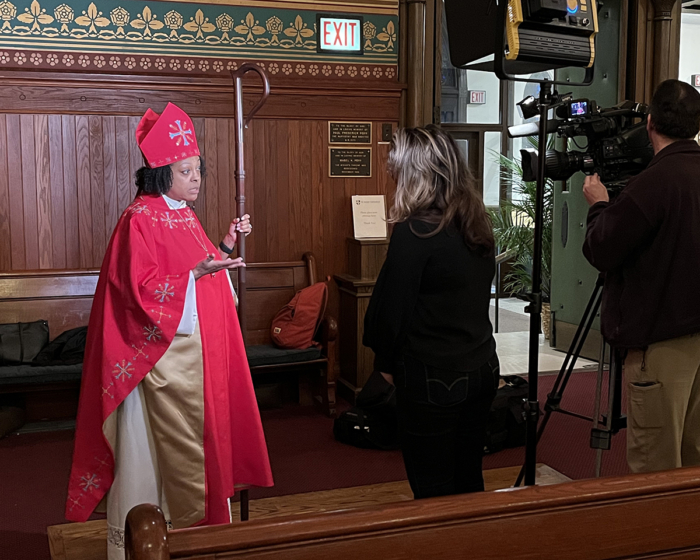
A public TV news crew interviews Chicago Bishop Paula Clark on April 4 at St. James Cathedral. Photo: David Paulsen/Episcopal News Service
Clark previously served as canon to the ordinary of the Diocese of Washington. She was known in that diocese for providing pastoral care to clergy and parishes facing difficult challenges, said the Rev. Jean Beniste, who served with Clark briefly in Washington. Beniste, now rector at Christ Episcopal Church in Waukegan, Illinois, said he is confident in Clark’s ability to unite the Diocese of Chicago in confronting whatever challenges it may face.
“She’s dealing with her health, but she’s still bringing the diocese back as one,” Beniste said.
Clark is upfront about her continued physical struggles and prolonged recovery. She has come a long way in two years. “2022 was much better than 2021,” Clark told ENS. “Not coincidentally, I turned 60 last year, so that was awesome. We had quite a celebration.”
Garcia, as her part-time chaplain, works with parishes in advance of her visits to determine how best to accommodate Clark during services and receptions. She can handle stairs carefully but does better remaining on one level. She also has trouble standing for long periods, so Garcia arranges for her to sit during confirmations, as allowed by the Book of Common Prayer’s rubrics.
“The congregations have been incredibly accommodating and gracious,” Garcia told ENS after the April 4 service at the cathedral. He described Clark as kind, gracious, funny and “completely comfortable with who she is, which puts others at ease.”
As a lay leader who lives in Chicago, Garcia also served on the standing committee for a year starting in late 2021, while the diocese was waiting to reschedule Clark’s consecration. “The time grew long, and I think folks were deeply desirous of having a diocesan bishop, and deeply committed to Paula as the person who had been called.”
A historic episcopate, delayed by health crises
Clark is Chicago’s 13th bishop. Her predecessor, Bishop Jeffrey Lee, originally planned to retire in August 2020, but when the pandemic hit that March, he announced he would delay his retirement until the end of the year. The diocese moved its bishop election online.
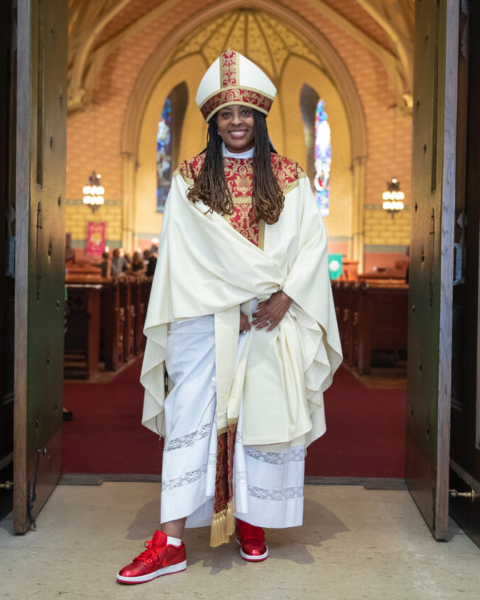
The Rt. Rev. Paula Clark is the Diocese of Chicago’s first female and first Black bishop. She also notes she is “the first differently abled person to take this job.” Photo: Charlie Simokaitis/Diocese of Chicago
On Dec. 12, 2020, Clark was elected unanimously on the fourth ballot from a pool of four candidates – the first woman and first African American chosen to lead the diocese. “We Episcopalians are strong people who can model for the rest of this country and the world what it looks like to walk the way of love,” Clark told the electing convention by Zoom. “God is calling us to a new day and a new way of being.”
The diocese received word two months later that a majority of bishops and standing committees had given their canonical consent to Clark’s election, and the consecration was set for April 24, 2021, at St. James Cathedral. Only a few dozen people would be allowed to attend in person because of pandemic precautions, and Ohio Bishop Mark Hollingsworth was to be the chief consecrator, because of pandemic limits on Presiding Bishop Michael Curry’s travel.
Clark, as bishop-elect, moved to Chicago and began meeting with clergy, while McLean, her husband, remained at their home in Maryland and sought a transfer to Chicago as an electrical contract employee with the Defense Department. On April 4, Clark issued her Easter message to the diocese on the theme of “A Holy Hope.”
Then on April 10, the cerebral bleed upended Clark’s preparations to become bishop. Her arteriovenous malformation meant essentially that the brain’s circuitry was “all jumbled up.” She is thankful that surgeons were able to rewire her brain in what she described as a “livesaving procedure.”
“Without it, I wouldn’t be here, and so we give God thanks for that,” she said. “This procedure allowed me a second chance at life.”
She was initially confined to the hospital, and continued to need physical and speech therapy after her release. The standing committee announced Clark’s consecration would be delayed to June, and a month later a follow-up message from Curry said the date had been moved again to August.
The delay “will provide a bit more space and time for Bishop-elect Clark to continue her work and her healing, her occupational and physical therapy, and to do all the things necessary so that she can assume the duties of the 13th bishop of the Diocese of Chicago,” Curry said.
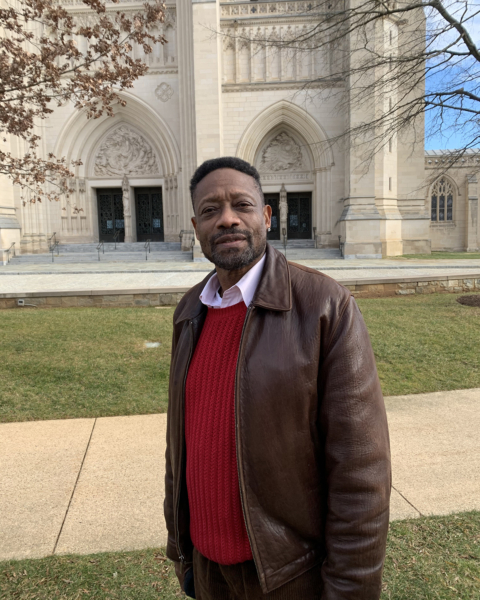
Bishop Paula Clark’s husband, Andrew McLean, was diagnosed with end-stage multiple myeloma in July 2021 while Clark was recovering from her surgery. Photo: Diocese of Chicago
By summer, however, Clark’s condition had not yet improved enough to proceed with the consecration. Bishop Chilton Knudsen, retired bishop of Maine, agreed to serve Chicago as assisting bishop in the interim.
Clark said she remained upbeat but impatient.
“I was ready to get going,” she told ENS, but “I had to wait. The recovery required it, and so that took some patience. … But the people here throughout the diocese were very understanding and supportive and prayed for me.”
Then toward the end of July, she learned that her husband was sick and she “dropped everything” to be with him in Maryland while continuing with her own recovery. “I’d go from his hospital room to [my] therapy and then go back to him,” she said. “He unfortunately succumbed to the multiple myeloma on Nov. 22, 2021.” McLean was 62.
Clark and McLean had a combined five adult children from their previous marriages, as well as seven grandchildren.
“Honestly, faith got me through,” said Clark, while also emphasizing the support she received from family, friends and people across the Diocese of Chicago. “This diocese is incredible,” she said. “I’m very thankful.”
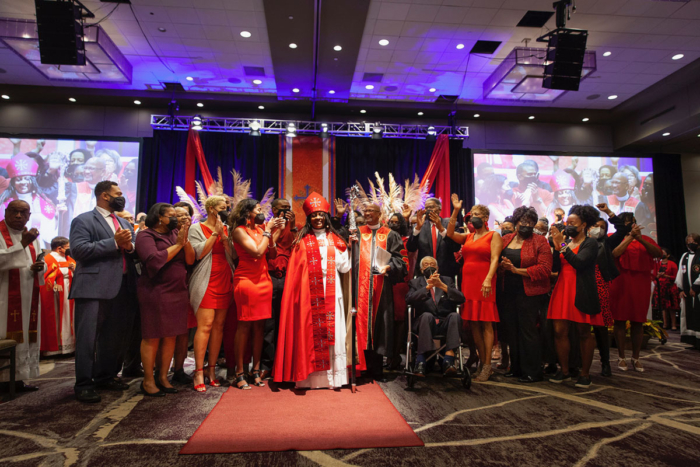
The Rt. Rev. Paula Clark is pictured with her family following her September 2022 consecration service at the Westin Hotel in Lombard, Illinois. Photo: Charlie Simokaitis/Diocese of Chicago
‘A joyous celebration’ at Clark’s consecration
When her consecration was finally rescheduled, on Sept. 17, 2022, pandemic restrictions had been lifted, and Curry served as chief consecrator. So many people wanted to attend that it was moved to a bigger venue, the Westin Hotel in the suburb of Lombard.
“It really was a glorious event,” Garcia said. “It was a joyous celebration for this diocese.”
He praised Clark for her “inner strength” and resiliency. “Also, so much goes without saying, but she’s a woman of deep faith, and that comes across in her preaching, that comes across with her interactions with members of congregations, that comes across in our conversations to and from the visits.”
Though the beginning of Clark’s episcopate has been defined by her personal health crisis and family tragedy, she sees her experience in a positive light, for what it means for the Diocese of Chicago.
“They got a better bishop,” she said. “I’m more compassionate. I know something more about the difficulties and struggles that face all of us. I think it’s made me more aware of the difference that a true faith can have on your whole outlook. … I’m certainly more cognizant of how fragile life is.”
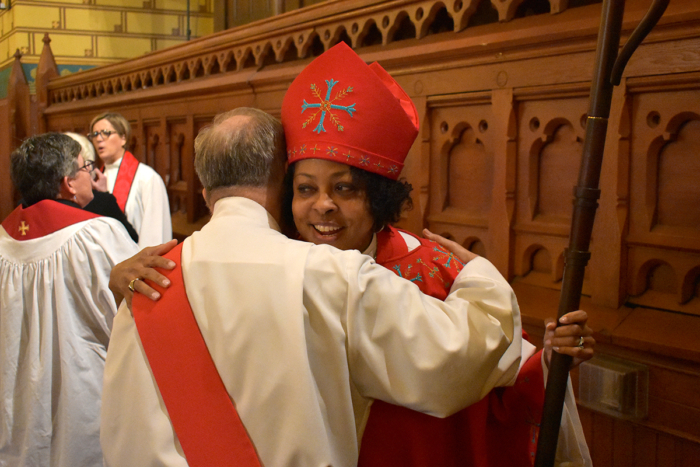
Chicago Bishop Paula Clark embraces clergy after the Chrism Mass and Renewal of Vows on April 4 at St. James Cathedral. Photo: David Paulsen/Episcopal News Service
Things that once bothered her don’t anymore, she added, and she relishes the time she spends with Episcopalians at their congregations. “God is good. That’s the best part of the work I do the meetings with people – encouraging, supporting, inspiring and just wrapping my arms around the good work and good ministry that all of us are doing. I love it. I love it.”
The Diocese of Chicago has 121 congregations, and it is her duty as bishop to visit them all, one by one. “When I go there, we might as well do everything we can do, because it might be a while before I get there again,” Clark said. One parish she visited was celebrating its anniversary, so she mentioned the milestone in her sermon while joining the festivities.
“It was a weekend full of stuff,” she said, “which was awesome.”
– David Paulsen is a senior reporter and editor for Episcopal News Service. He can be reached at dpaulsen@episcopalchurch.org.

Social Menu